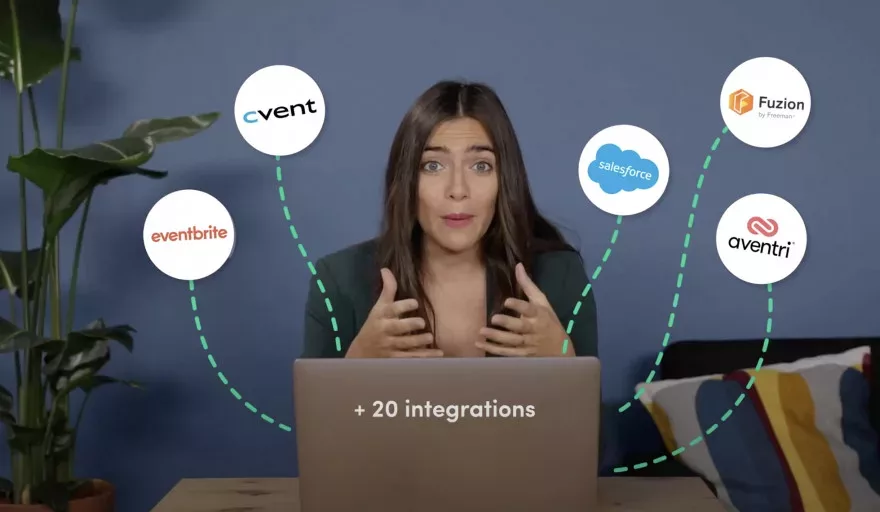The events industry has changed over the past year, we look at Swapcard and its provision of a digital interaction platform for virtual and hybrid events.
The negative impacts of the COVID-19 pandemic have been felt in almost every industry across the globe.
On top of sectors such as travel and tourism, the events industry stands out as one that had been ground to a halt during the majority of 2020, and one that has had to substantially adapt in light of the virus and its consequential effects.
Enter Swapcard, the company revolutionising the event industry in Europe and beyond. Swapcard is a Parisian-based AI-powered event and matchmaking platform that runs in-person, virtual and hybrid events. The start-up helps organise and improve the interaction between attendees and exhibitors during events. It provides a platform that encourages, aids, and promotes digital networking between attendees as well as those leading such events.
With digital events having led the industry for the past year and into the present, we spoke with Baptiste Boulard, CEO of Swapcard, about the future of the events industry.

Q&A WITH BAPTISTE BOULARD, CEO, SWAPCARD
Firstly Baptiste, tell us a little about yourself. How did you come to work alongside Swapcard?
Baptiste Boulard (BB): I was previously a lawyer working for the UK firm Allen & Overy as, originally, I aimed to work in the oil and gas industry. I was handed a business card by an industry member and told to reach out to them, however, as they had left their company to work for a subsidiary, all of their contact details on the card were out of date. Instead, we decided to exchange a piece of paper with our various digital details on them.
I realised that we needed a digital contact management solution, and the initial idea of Swapcard was born from the simple notion of the need to “swap digital business cards”. We needed to be connected through a platform and required an expanded network of digital connections with various industry members. And where do people network and exchange details? It is of course during events. Swapcard met the need for people to network digitally during events, and by 2007, Swapcard had developed into its first iteration of a digital business card networking platform.
Who benefits from virtual events?
BB: During the start of the pandemic event organisers initially put up with a lot of problems during the transition to digital evolution in the sector, however now virtual events bring with it many opportunities and benefits.
Virtual conferencing becomes much easier as we are able to host many more attendees due to no longer needing travel and all those associated costs and logistical plans. You’re removing all the associated issues regarding attending an event, such as catering, accommodation, on-site space and seating, and transport, at the same time as increasing your attendee volume substantially.
This goes hand-in-hand with the accessibility benefits for those attendees. With Swapcard, logistical restrictions are no longer an issue, with any individual from any part of the world being able to join a call or conference and become part of a digital event, to reach out privately and network with other industry members or join group calls regarding a singular topic.
On top of this, the introduction of widespread hybrid events has allowed event organisers to benefit in the long term. The ability to have on-site attendees for face-to-face interaction as well as using Swapcard’s online connection services allows individuals from around the globe to attend who would not be able to otherwise. You can interact with the brands on show, and you can network with people that form the community audience. It has been a huge benefit for the attendees.
Traditionally, lots of people could miss a lot of content at physical events and miss a lot of networking opportunities because so much going on and their time is limited. But with virtual events everything is safe online in the cloud and you can have access to all this content even after the event, and so what we can see is that people are creating an on-demand access library made of collective events content for those who need it.
It is benefitting many people evenly, however there are still issues. Some people will argue that, of course, they have lost a lot of revenue from a lack of hosting physical events, and that they had to fire a lot of people relating to traditional event planning.
Is this the end of physical events?
BB: People spend increasingly more time online, and they want to be more and more efficient. The trends of maximising digitalisation as well as expenditure cost cutting and the many practical reasons behind virtual events have pushed digital and hybrid events to the front of the industry.
So, people will really question attending physical events for many reasons, such as virus safety, and the time and financial costs of physically attending.
However, as Aristotle said, “Man is by nature a social animal”, and we actively like to interact and do face-to-face meetings, especially when we want to promote ourselves. Certain products or services are also very hard to promote online, and many people simply enjoy the event functions that take place across the various industries. This mixture of socialising, direct promotion, and enjoyment means that physical events will never die, but we simply have more means by which to experience events.
Are we witnessing the birth of a new profession… the Virtual Event Planner?
BB: Businesses have realised that they have a higher budget to spend on events now that they can reduce the costs of physical events by utilising digital platforms as well as being able to increase the number of attendees. Since digital events have come to the fore, digital and hybrid event planning has now become a more important role for companies across the board.
Some companies organise monthly virtual events to keep their audience engaged, and so the Virtual Event Planner has very much become a more prominent profession.



















